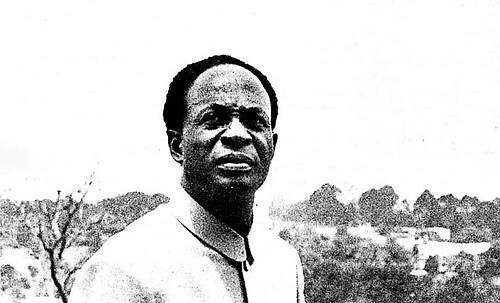
Dr. Kwame Nkrumah of Ghana who led the national independence and Pan-African movements of the post World War II period. 2009 marked the 100th anniversary of his birth., a photo by Pan-African News Wire File Photos on Flickr.
Post-colonial African education system failing African economic renaissance
November 8, 2013 Opinion & Analysis
Panganai Kahuni
Zimbabwe Herald
IN my last instalment I promised to unravel how the West was threatening humankind through production and use of weapons of mass destruction. After giving it a critical thought, I later decided to first deal with how Africa’s education system was failing to nurture intellectuals academics and scholars with an ideological grounding that makes Africa’s economic renaissance a reality.
Bob Marley, in one of his greatest songs said “emancipate yourself from mental slavery”.
This musical maxim can form a doctoral thesis that could inform Africa’s education system on how to produce curricular that focuses on African industrial development.
It is a song that if all African academics were nurtured to give the song an African philosophical thought, African Renaissance would have been achieved.
Unfortunately, most African education systems still practice western models of teachings that continue to produce intellectuals/academics of neo-liberal western philosophical thinking that prides on westernization of Africa.
Ideologically, Africa’s education system, to a large extent, is failing to produce educated people with an Afro-centric philosophical grounding poised to raise Africa to greater heights of industrialization and economic independence.
The post-colonial education system has sadly failed to take advantage of the Pan-African ideological system that was laid by African liberation nationalists such as Nkrumah, Kenyatta, Nyerere and many others.
Instead of nurturing intellectuals that are African in spirit and mind the system has continued to produce Intellectuals of Euro-centrism that criticize Afro-centrism not for its development but for self-enrichment as what those in the opposition camps in Africa are doing.
Some African academics in positions of business leadership or were in position of political leadership continue to tell African philosophies with European meaning.
Imagine such people of high academic stature criticising African economic strategies such as Industrial and Agricultural revolution in Ghana and land reform and Indigenisation in southern Africa.
I am not saying critiquing such economic policies is bad but the critique must be aimed at developing ideas that would have been generated by those being criticised.
Criticising for the sack of advancing Western ideas that are meant to continually enslave Africans should be regarded as academic corruption and hypocrisy.
When academics and intellectuals engage in politics of criticising developmental policies in a way of advancing Western hegemonic dominance of Africans resources, one wonders how we as Africans would create employment for the thousands of youths that finish University and are not able to create or get employment.
Nkrumah believed that Africa can only be developed and emancipated by Africans themselves and that no foreign power could claim to have an altruistic interest in the continent.
Nkrumah also stressed that Africans must rely upon themselves for their own development instead of running about cap in hand after foreign aid or assistance.
Nkrumah pointed out that neo-colonialism uses foreign investments as one of its weapons for denying Africa control of its sovereign resources. He highlighted that Africa was not against foreign investment as such but was against its misuse and the attempt to use foreign investment to control direct and manipulate the political and economic future of Africa’s development that would make Africa a neo-colonial continent.
Fellow Africans, remember the mushrooming of non-state actors, civil society groups, neo-liberal human rights groups NGO, all funded and founded by Western aid agencies such as Ford, USIAD who are wolves in sheep skin that preach democracy, good governance, the rule of law and many such other pseudo rights of righteousness. All these institutions of evil that seem to practise Godly ventures in Africa are run by African academics and intellectuals that have been produced by African education systems.
The questions that arise are: Why are African scholars fond of betrayal rather than being assertive as was the case with Nkrumah, Chitepo, Nkomo, OR Tambo and others.
I was fascinated by what Mbeki said to academics and scholars at a public lecture at Unisa whose contents were published in the New Africa Magazine October 2013 edition when he questioned the intellectuals why they always wanted an African story to be either told or written by foreigners who structure it for their own Western political interests.
This was after he had attended the inauguration of President Mugabe and he was talking about the demonisation of the land reform by the Western and by some Western funded scholars.
This was a challenge by Mbeki to African scholars.
Panganai Kahuni is a Political Socio-Economic commentator
No comments:
Post a Comment